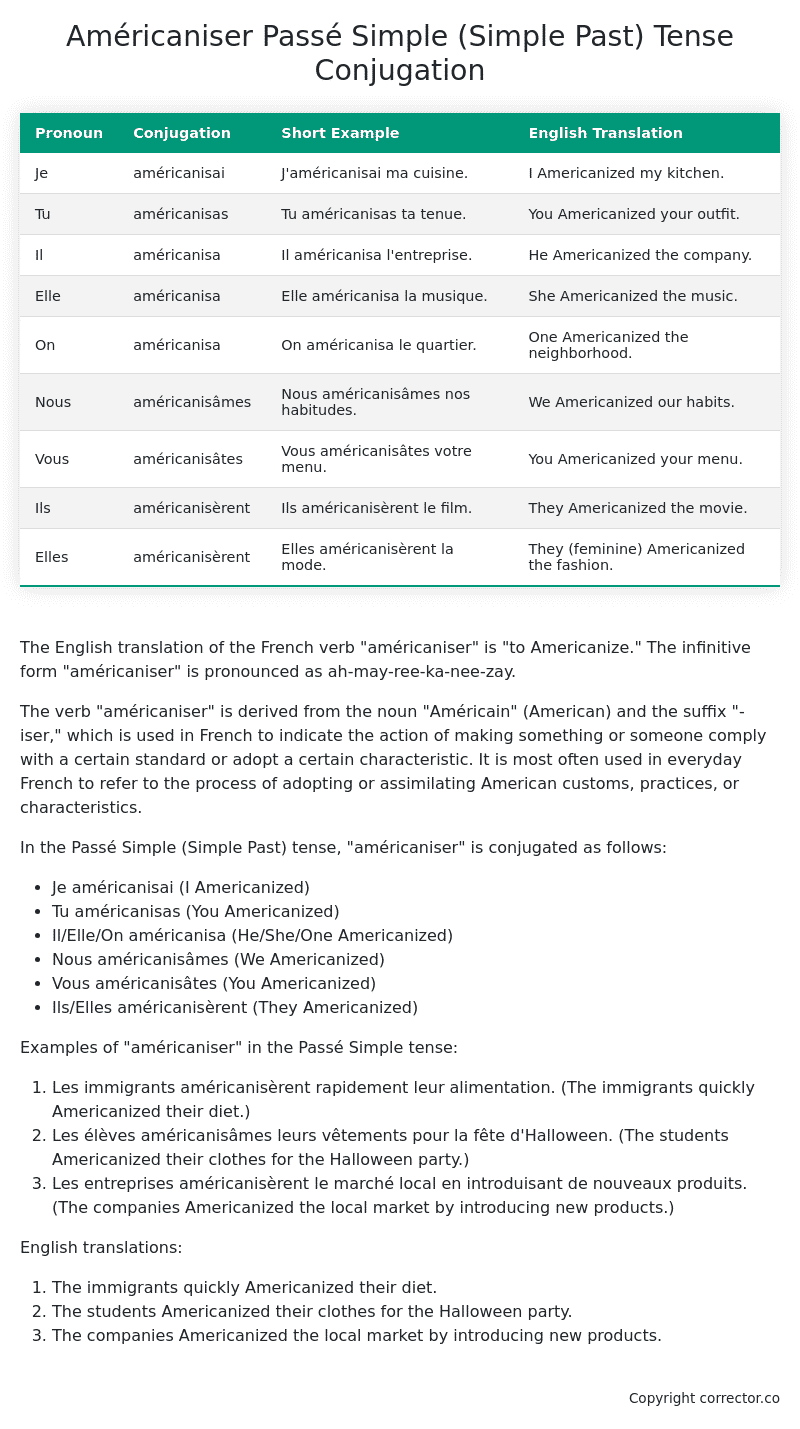Passé Simple (Simple Past) Tense Conjugation of the French Verb américaniser
Introduction to the verb américaniser
The English translation of the French verb “américaniser” is “to Americanize.” The infinitive form “américaniser” is pronounced as ah-may-ree-ka-nee-zay.
The verb “américaniser” is derived from the noun “Américain” (American) and the suffix “-iser,” which is used in French to indicate the action of making something or someone comply with a certain standard or adopt a certain characteristic. It is most often used in everyday French to refer to the process of adopting or assimilating American customs, practices, or characteristics.
In the Passé Simple (Simple Past) tense, “américaniser” is conjugated as follows:
- Je américanisai (I Americanized)
- Tu américanisas (You Americanized)
- Il/Elle/On américanisa (He/She/One Americanized)
- Nous américanisâmes (We Americanized)
- Vous américanisâtes (You Americanized)
- Ils/Elles américanisèrent (They Americanized)
Examples of “américaniser” in the Passé Simple tense:
- Les immigrants américanisèrent rapidement leur alimentation. (The immigrants quickly Americanized their diet.)
- Les élèves américanisâmes leurs vêtements pour la fête d’Halloween. (The students Americanized their clothes for the Halloween party.)
- Les entreprises américanisèrent le marché local en introduisant de nouveaux produits. (The companies Americanized the local market by introducing new products.)
English translations:
- The immigrants quickly Americanized their diet.
- The students Americanized their clothes for the Halloween party.
- The companies Americanized the local market by introducing new products.
Table of the Passé Simple (Simple Past) Tense Conjugation of américaniser
| Pronoun | Conjugation | Short Example | English Translation |
|---|---|---|---|
| Je | américanisai | J’américanisai ma cuisine. | I Americanized my kitchen. |
| Tu | américanisas | Tu américanisas ta tenue. | You Americanized your outfit. |
| Il | américanisa | Il américanisa l’entreprise. | He Americanized the company. |
| Elle | américanisa | Elle américanisa la musique. | She Americanized the music. |
| On | américanisa | On américanisa le quartier. | One Americanized the neighborhood. |
| Nous | américanisâmes | Nous américanisâmes nos habitudes. | We Americanized our habits. |
| Vous | américanisâtes | Vous américanisâtes votre menu. | You Americanized your menu. |
| Ils | américanisèrent | Ils américanisèrent le film. | They Americanized the movie. |
| Elles | américanisèrent | Elles américanisèrent la mode. | They (feminine) Americanized the fashion. |
Other Conjugations for Américaniser.
Le Present (Present Tense) Conjugation of the French Verb américaniser
Imparfait (Imperfect) Tense Conjugation of the French Verb américaniser
Passé Simple (Simple Past) Tense Conjugation of the French Verb américaniser (You’re reading it right now!)
Passé Composé (Present Perfect) Tense Conjugation of the French Verb américaniser
Futur Simple (Simple Future) Tense Conjugation of the French Verb américaniser
Futur Proche (Near Future) Tense Conjugation of the French Verb américaniser
Plus-que-parfait (Pluperfect) Tense Conjugation of the French Verb américaniser
Passé Antérieur (Past Anterior) Tense Conjugation of the French Verb américaniser
Futur Antérieur (Future Anterior) Tense Conjugation of the French Verb américaniser
Subjonctif Présent (Subjunctive Present) Tense Conjugation of the French Verb américaniser
Subjonctif Passé (Subjunctive Past) Tense Conjugation of the French Verb américaniser
Subjonctif Imparfait (Subjunctive Imperfect) Tense Conjugation of the French Verb américaniser
Conditionnel Présent (Conditional Present) Tense Conjugation of the French Verb américaniser
Conditionnel Passé (Conditional Past) Tense Conjugation of the French Verb américaniser
Conditionnel Passé II (Conditional Past II) Tense Conjugation of the French Verb américaniser
L’impératif Présent (Imperative Present) Tense Conjugation of the French Verb américaniser
L’impératif Passé (Imperative Past) Tense Conjugation of the French Verb américaniser
L’infinitif Présent (Infinitive Present) Tense Conjugation of the French Verb américaniser
L’infinitif Passé (Infinitive Past) Tense Conjugation of the French Verb américaniser
Le Participe Présent (Present Participle) Tense Conjugation of the French Verb américaniser
Le Participe Passé (Past Participle) Tense Conjugation of the French Verb américaniser
Struggling with French verbs or the language in general? Why not use our free French Grammar Checker – no registration required!
Get a FREE Download Study Sheet of this Conjugation 🔥
Simply right click the image below, click “save image” and get your free reference for the américaniser Passé Simple tense conjugation!

Américaniser – About the French Passé Simple (Simple Past) Tense
Formation
Usage
Narration
Historical Context
Interactions with other tenses
Passé Composé
Imparfait
Conditional and Subjunctive
Summary
I hope you enjoyed this article on the verb américaniser. Still in a learning mood? Check out another TOTALLY random French verb conjugation!


